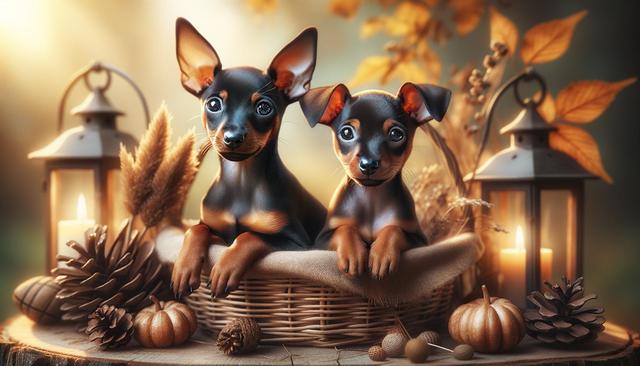
Miniature Pinscher Puppies: Spirited Companions with Big Personalities
Understanding the Miniature Pinscher Breed
Miniature Pinschers, often affectionately called “Min Pins,” are a small breed with a big presence. Despite their resemblance to larger breeds, they are not a miniature version of the Doberman, but rather a distinct breed with a long history. Originating in Germany, they were initially bred for hunting small rodents. Their confident posture and quick, graceful movements often give the impression of a much larger dog.
This breed is classified as a toy dog, but don’t let the label fool you. Miniature Pinschers are known for their fearless demeanor and lively temperament. They typically weigh between 8 to 12 pounds and stand around 10 to 12.5 inches tall. Their sleek, short coat comes in various colors, including black and rust, chocolate, and red. These dogs are not just charming in appearance; they are also known for their alertness and loyalty.
Personality and Temperament
Miniature Pinscher puppies are full of energy and spunk. They are curious, intelligent, and often described as having a “big dog” attitude. Their boldness can be both entertaining and challenging, especially for first-time dog owners. These puppies are highly alert and make excellent watchdogs, often barking to alert their families of unfamiliar sounds or visitors.
While their outgoing nature is a plus, it’s important to channel their energy appropriately. Without proper training and socialization, Min Pins can become overly protective or assertive. However, with consistent guidance, they grow into confident and well-mannered pets. Their spirited nature makes them great companions for active individuals or families who can keep up with their pace.
Training and Socialization
Training Miniature Pinscher puppies requires patience and positive reinforcement. Their intelligence means they learn quickly, but their independence can sometimes lead to stubbornness. Early training helps establish good behavior patterns and ensures they respond well to commands. Socialization is equally crucial, as it helps them interact positively with other dogs and people.
Some tips for training a Miniature Pinscher puppy include:
- Use rewards-based training with treats and praise
- Keep sessions short and engaging to hold their attention
- Expose them to various environments, people, and other animals
- Be consistent and firm, yet gentle
Obedience classes can also be beneficial, offering structured learning and opportunities for social interaction. Starting early will help curb undesirable behaviors and build a strong bond between puppy and owner.
Exercise and Mental Stimulation
Despite their small size, Miniature Pinschers require ample physical and mental stimulation. They are energetic and thrive in environments where they can run, play, and explore. Daily walks are essential, and playtime in a secure yard or indoor space helps expend their energy.
In addition to physical activity, mental stimulation is key to a well-balanced Miniature Pinscher. Boredom can lead to destructive behavior, so it’s important to provide interactive toys, puzzle feeders, and opportunities for learning new tricks or commands. Min Pins also enjoy games that challenge their minds, such as hide-and-seek or scent-based activities.
Some engaging activities for Min Pins include:
- Agility training or obstacle courses
- Interactive toys that require problem-solving
- Fetching games with small, lightweight toys
Keeping your puppy engaged both mentally and physically will contribute to a healthier and happier pet.
Care and Health Considerations
Miniature Pinschers are relatively low-maintenance when it comes to grooming, thanks to their short coat. Weekly brushing is usually enough to keep their fur healthy and free of loose hairs. Regular nail trimming, ear cleaning, and dental care should also be part of their grooming routine.
While generally a healthy breed, Miniature Pinschers can be prone to certain conditions such as patellar luxation, hip dysplasia, and progressive retinal atrophy. Regular veterinary check-ups and a balanced diet can help prevent or manage these issues. It’s also important to keep them warm in colder weather due to their sleek coats and small size.
Diet plays a crucial role in their overall health. Choose high-quality dog food appropriate for their size and activity level, and monitor portion sizes to avoid weight gain. Clean, fresh water should always be available, and treats should be given in moderation.
Vaccinations, parasite prevention, and routine health screenings are essential to ensure your Miniature Pinscher puppy grows into a healthy adult dog. Consulting with a veterinarian about a tailored health plan will give your puppy the best start in life.


